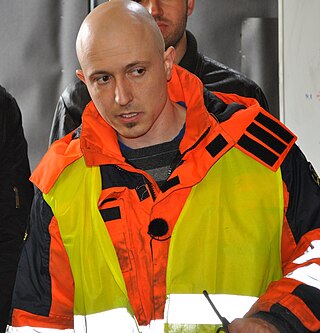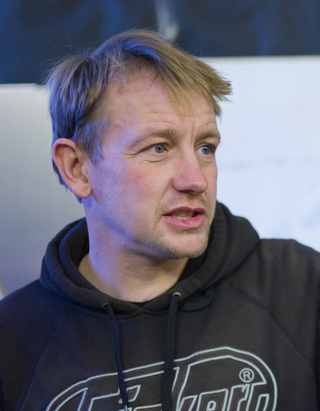Related Research Articles

Denmark has considerable sources of oil and natural gas in the North Sea and ranked as number 32 in the world among net exporters of crude oil in 2008. Denmark expects to be self-sufficient with oil until 2050. However, gas resources are expected to decline, and production may decline below consumption in 2020, making imports necessary. Denmark imports around 12% of its energy.

This comparison of orbital launch systems lists the attributes of all individual rocket configurations designed to reach orbit. A first list contains rockets that are operational or in development as of 2023; a second list includes all upcoming rockets and a third list includes all retired rockets. For the simple list of all conventional launcher families, see: Comparison of orbital launchers families. For the list of predominantly solid-fueled orbital launch systems, see: Comparison of solid-fueled orbital launch systems.

Andreas Enevold "Andy" Mogensen is a Danish engineer and ESA astronaut who is best known for being the first Dane to fly in space as part of the European Space Agency's Iriss program. Mogensen has also been involved in a number of other space-related projects throughout his career, including working as a test engineer for ESTEC and as a member of the European Astronaut Corps. In addition to his work with ESA, he has also worked with NASA and other international space agencies. Mogensen returned to space in August 2023 for his second spaceflight to the ISS onboard SpaceX Crew Dragon as the first non-American to serve as a pilot.

Rocket Lab USA, Inc. is a publicly traded aerospace manufacturer and launch service provider that operates and launches lightweight Electron orbital rockets used to provide dedicated launch services for small satellites as well as a suborbital variant of Electron called HASTE. The company plans to build a larger Neutron rocket as early as 2024. Electron rockets have launched 44 times from either Rocket Lab's Launch Complex 1 in New Zealand or at the Mid-Atlantic Regional Spaceport in Wallops Island, Virginia, United States. Rocket Lab has launched one HASTE rocket to date from Wallops Island, Virginia.

Copenhagen Suborbitals is a crowd-funded human space program. It has flown six home-built rockets and capsules since 2011. The organization successfully launched its Nexø II rocket in the summer of 2018. Its stated goal is to have one of its members reach space on a sub-orbital spaceflight. The organization was founded by Kristian von Bengtson and Peter Madsen.

UC3 Nautilus was a privately built Danish midget submarine. It was built over a three-year period by Peter Madsen and a group of volunteers, and cost approximately US$200,000 to build. The submarine was Madsen's third submarine design.

HEAT 1X Tycho Brahe was the first rocket and spacecraft combination built by Copenhagen Suborbitals, a Danish organization attempting to perform the first amateur suborbital human spaceflight. The vehicle consisted of a motor named HEAT-1X and a spacecraft Tycho Brahe. Its launch location was a floating platform named Sputnik. The rocket was test launched twice: In 2010 a power shortage caused a valve to freeze shut, which prevented launch. In 2011 the rocket was successfully launched, reaching an altitude of 2.8 kilometres (1.7 mi) before the engine was remotely shut off due to a wrong trajectory.

Kristian von Bengtson is a Danish architect, specializing in crewed spaceflight, a resident of Copenhagen and married to animation director Karla von Bengtson. He is most notable for his involvement in founding Copenhagen Suborbitals and European launcher company Orbex.

Peter Langkjær Madsen is a Danish convicted murderer and former entrepreneur. In April 2018, he was convicted of the August 2017 murder of Swedish journalist Kim Wall on board his submarine, UC3 Nautilus, and sentenced to life imprisonment.

This article compares different orbital launcher families. The article is organized into two tables: the first contains a list of currently active and under-development launcher families, while the second contains a list of retired launcher families.

Orbital-3, also known as Orb-3, was an attempted flight of Cygnus, an automated cargo spacecraft developed by United States-based company Orbital Sciences, on 28 October 2014. The mission was intended to launch at 22:22:38 UTC that evening. This flight, which would have been its fourth to the International Space Station and the fifth of an Antares launch vehicle, resulted in the Antares rocket exploding seconds after liftoff.

Planet Labs PBC is a publicly trading American Earth imaging company based in San Francisco, California. Their goal is to image the entirety of the Earth daily to monitor changes and pinpoint trends.

Firefly Aerospace is an American private aerospace firm based in Cedar Park, Texas, that develops launch vehicles for commercial launches to orbit. The company completed its $75 million Series A investment round in May 2021, which was led by DADA Holdings. The current company was formed when the assets of the former company Firefly Space Systems were acquired by EOS Launcher in March 2017, which was then renamed Firefly Aerospace. Firefly's stated purpose is to increase access to space, similar to other private spaceflight companies.

Electron is a two-stage, partially recoverable orbital launch vehicle developed by Rocket Lab, an American aerospace company with a wholly owned New Zealand subsidiary. Electron was developed to service the commercial small satellite launch market. Its Rutherford engines are the first electric-pump-fed engine to power an orbital-class rocket. Electron is often flown with a kickstage or Rocket Lab's Photon spacecraft. Although the rocket was designed to be expendable, Rocket Lab has recovered the first stage twice and is working towards the capability of reusing the booster. The Flight 26 (F26) booster has featured the first helicopter catch recovery attempt.
Space launch market competition is the manifestation of market forces in the launch service provider business. In particular it is the trend of competitive dynamics among payload transport capabilities at diverse prices having a greater influence on launch purchasing than the traditional political considerations of country of manufacture or the national entity using, regulating or licensing the launch service.
Kraka, or UC2 Kraka was an amateur-built midget submarine completed in 2005, the first diesel–electric amateur sub in Denmark. It was built by Peter Madsen, Claus Nørregaard and several other people. The overall length was 12.6 meters (41 ft), and it displaced 6 tonnes. The propulsion was diesel–electric with a 16 hp diesel engine and an 8 hp electric motor. Kraka can be seen at Denmark's Technical Museum in Elsinore . Kraka is named after a woman in Norse mythology known for her intelligence.
Freya or UC1 Freya was the first private Danish submarine, and thus first amateur electric sub in Denmark. It was built by Peter Madsen and Claus Nørregaard in 2001–2002, as a demonstrator to try submarine technology. Having made over 500 dives, it was decommissioned, as it was not designed for a long service life. It was decommissioned in 2006 after UC2 Kraka had been worked up. The submarine was then docked and allowed to decay. Final decontamination was done, and it was towed out to sea by UC3 Nautilus, in August 2008, and sunk as an artificial reef near Copenhagen. Freya is named after the Norse goddess of fertility and love.

Firefly Alpha is a two-stage orbital expendable launch vehicle developed by the American company Firefly Aerospace to compete in the commercial small satellite launch market. Alpha is intended to provide launch options for both full vehicle and rideshare customers.

The murder of Kim Wall, known in Denmark as Ubådssagen, took place on 10 August 2017, after Swedish freelance journalist Kim Wall boarded the midget submarine UC3 Nautilus, in Køge Bugt, Denmark, with the intent of interviewing its owner, Danish entrepreneur Peter Madsen.
References
- ↑ Peter Hansen. "Home". Adastra.systems. Archived from the original on 19 November 2014. Retrieved 14 December 2014.
- ↑ "Raket-Madsens Rumlaboratorium - Ingeniøren". Ingeniøren. Archived from the original on 18 December 2014. Retrieved 14 December 2014.
- ↑ "Forside". Ing.dk. Archived from the original on 17 December 2014. Retrieved 14 December 2014.
- ↑ "Bog - Dafolo A/S Raket-Madsen". Dafolo-online.dk. Archived from the original on 13 November 2014. Retrieved 14 December 2014.
- ↑ "Flight Alpha | RML". Archived from the original on 2017-08-27. Retrieved 2017-08-27.
- ↑ "RML Space Lab – Mach 5 Low-down". Mach5lowdown.wordpress.com. Archived from the original on 27 August 2017. Retrieved 25 April 2018.